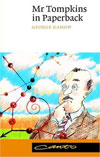
Mr. Tompkins in Paperback
By George Gamow
Not to condone procrastination, but I happened on George Gamow's marvelous Mr. Tompkins books in the Columbia University physics library while I was industriously not studying for a physics exam, and they changed my life. After reading the two slim volumes in a single sitting, I knew that I wanted to be a science writer. Gamow was a giant of 20th-century physics who thought that the revolutionary discoveries in his field were too astonishing for physicists to keep to themselves. How to convey Einstein's theory of relativity or, gulp, quantum mechanics to the general public? Gamow used Lewis Carroll's trusty trope, the picaresque dream. Mr. Tompkins is an earnest bank clerk determined to improve himself by attending physics lectures at a local university. Luckily for the reader, he can't help but fall asleep, and in his dreams abstrusities are dramatized by being rescaled to human size. We see how relativity works, for example, by visiting a town where the speed of light seems to be only 25 miles per hour, and we glimpse the bizarre realms of the atom in a land where billiard balls, kittens, and elephants all behave like subatomic particles. Dream on, Mr. Tompkins.
By George Gamow
Not to condone procrastination, but I happened on George Gamow's marvelous Mr. Tompkins books in the Columbia University physics library while I was industriously not studying for a physics exam, and they changed my life. After reading the two slim volumes in a single sitting, I knew that I wanted to be a science writer. Gamow was a giant of 20th-century physics who thought that the revolutionary discoveries in his field were too astonishing for physicists to keep to themselves. How to convey Einstein's theory of relativity or, gulp, quantum mechanics to the general public? Gamow used Lewis Carroll's trusty trope, the picaresque dream. Mr. Tompkins is an earnest bank clerk determined to improve himself by attending physics lectures at a local university. Luckily for the reader, he can't help but fall asleep, and in his dreams abstrusities are dramatized by being rescaled to human size. We see how relativity works, for example, by visiting a town where the speed of light seems to be only 25 miles per hour, and we glimpse the bizarre realms of the atom in a land where billiard balls, kittens, and elephants all behave like subatomic particles. Dream on, Mr. Tompkins.
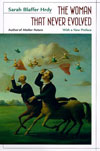
The Woman That Never Evolved
By Sarah Blaffer Hrdy
Nowadays Charles Darwin is a kind of pop icon right up there with Albert Einstein, and people casually cite "evolution" and "DNA" to explain why we shop too much, cheat on our mates, and have trouble losing weight. Yet when Hrdy wrote this breakthrough book in 1981, biologically flavored explanations for human behavior were decidedly unpopular. A primatologist by training and feminist by predilection, Hrdy asked the basic and in my mind perfectly sensible question: How do women compare to other female primates? What can we understand about our urges, desires, and fears, our sexuality, our relationships with men and with other women, and the near universality of women's second-class status, by examining the lives and loves of our closest nonhuman kin? Among Hrdy's many bracing conclusions: Far from being coy and sexually tepid, as the stereotype has it, women may well have evolved for a restless sort of promiscuity, the better to confuse issues of paternity and thus heighten their children's chances of survival in the hazardous, half-cocked company of men.
By Sarah Blaffer Hrdy
Nowadays Charles Darwin is a kind of pop icon right up there with Albert Einstein, and people casually cite "evolution" and "DNA" to explain why we shop too much, cheat on our mates, and have trouble losing weight. Yet when Hrdy wrote this breakthrough book in 1981, biologically flavored explanations for human behavior were decidedly unpopular. A primatologist by training and feminist by predilection, Hrdy asked the basic and in my mind perfectly sensible question: How do women compare to other female primates? What can we understand about our urges, desires, and fears, our sexuality, our relationships with men and with other women, and the near universality of women's second-class status, by examining the lives and loves of our closest nonhuman kin? Among Hrdy's many bracing conclusions: Far from being coy and sexually tepid, as the stereotype has it, women may well have evolved for a restless sort of promiscuity, the better to confuse issues of paternity and thus heighten their children's chances of survival in the hazardous, half-cocked company of men.
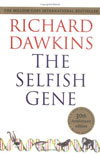
The Selfish Gene
By Richard Dawkins
Every single science writer in the world not named Richard Dawkins is or should be jealous of this book. It is beyond brilliant; it is a continent unto itself, the kingdom Dawkinsalia. In prose at once precise, buoyant, generous, and scalding, Dawkins argues that we are not what we think we are—big-brained, upstanding, autonomously acting individuals here for the greater glory of ourselves and the human race. No, we are here at the behest of what he calls our replicators, our genes. "We are," he writes, "their survival machines." You can think of those genes mechanistically, as the molecular necklaces of carbon, oxygen, and other elements that are stuffed into every cell of the body; or you can think of them metaphorically, as recipes or blueprints or instruction manuals for how to build and maintain a human being. No matter how you frame or fancy them, your genes care only for their own perpetuity. They were there before you. They will do their damnedest to be there after you. You are a momentary fling, a vessel to be used and then tossed. Depressing? Maybe. But Dawkins also reminds us that a big brain and the body below it sure make for a mighty fine ride.
By Richard Dawkins
Every single science writer in the world not named Richard Dawkins is or should be jealous of this book. It is beyond brilliant; it is a continent unto itself, the kingdom Dawkinsalia. In prose at once precise, buoyant, generous, and scalding, Dawkins argues that we are not what we think we are—big-brained, upstanding, autonomously acting individuals here for the greater glory of ourselves and the human race. No, we are here at the behest of what he calls our replicators, our genes. "We are," he writes, "their survival machines." You can think of those genes mechanistically, as the molecular necklaces of carbon, oxygen, and other elements that are stuffed into every cell of the body; or you can think of them metaphorically, as recipes or blueprints or instruction manuals for how to build and maintain a human being. No matter how you frame or fancy them, your genes care only for their own perpetuity. They were there before you. They will do their damnedest to be there after you. You are a momentary fling, a vessel to be used and then tossed. Depressing? Maybe. But Dawkins also reminds us that a big brain and the body below it sure make for a mighty fine ride.
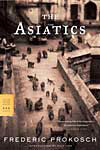
The Asiatics
By Frederic Prokosch
This is one of the greatest novels that nobody has ever heard of. Certainly, I had never heard of it when I idly picked it up at a bookstore and saw the lineup of cover squibs so swooning in tone and exalted in provenance I almost thought the whole thing was a joke. Thomas Mann said it was so "astonishing" that he "was unable to tear [himself] away," Albert Camus called Prokosch a "virtuoso," and André Gide declared it an "authentic masterpiece."
Well, the immortal blurbers weren't kidding. I couldn't put the book down. It is an astonishing masterpiece that I have since pressed on many a good friend and bare acquaintance alike, all of them previously benighted, all of them quick converts to the author's exuberant gloom. Published in 1935, the novel follows a young American hitchhiker as he travels with fierce aimlessness through Asia. He meets princes, thieves, priests, and eunuchs, young boy prostitutes and aging, self-dramatizing madames, and they ask him, What do you think of life? Tell me of your life. Are you happy? At times he tries to answer, at others he rebuffs their prying, at still others, sudden violence intervenes. It is a misanthropic, gorgeous odyssey through a part of the world that, astonishingly, Prokosch never visited, but evoked so persuasively that my husband, an old Asia wayfarer, felt he was back on the road.
By Frederic Prokosch
This is one of the greatest novels that nobody has ever heard of. Certainly, I had never heard of it when I idly picked it up at a bookstore and saw the lineup of cover squibs so swooning in tone and exalted in provenance I almost thought the whole thing was a joke. Thomas Mann said it was so "astonishing" that he "was unable to tear [himself] away," Albert Camus called Prokosch a "virtuoso," and André Gide declared it an "authentic masterpiece."
Well, the immortal blurbers weren't kidding. I couldn't put the book down. It is an astonishing masterpiece that I have since pressed on many a good friend and bare acquaintance alike, all of them previously benighted, all of them quick converts to the author's exuberant gloom. Published in 1935, the novel follows a young American hitchhiker as he travels with fierce aimlessness through Asia. He meets princes, thieves, priests, and eunuchs, young boy prostitutes and aging, self-dramatizing madames, and they ask him, What do you think of life? Tell me of your life. Are you happy? At times he tries to answer, at others he rebuffs their prying, at still others, sudden violence intervenes. It is a misanthropic, gorgeous odyssey through a part of the world that, astonishingly, Prokosch never visited, but evoked so persuasively that my husband, an old Asia wayfarer, felt he was back on the road.
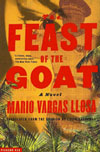
The Feast of the Goat
By Mario Vargas Llosae
This book was published in America two years before we invaded Iraq, but Vargas Llosa's gothically clinical vivisection of a dictatorship and the completeness with which it defiles everything around it evokes the grisly saga of Saddam Hussein's reign and its blood-riven aftermath. The primary protagonist among some half-dozen deftly interlocking characters is Urania Cabral, a 49-year-old World Bank official who returns to the Dominican Republic for the first time since she fled her natal island and its then ruling monster, Rafael Trujillo, at the age of 14. Urania's odd name irritates, haunts, and ultimately suits her. Like the planet, she is dark, distant, and formidably obscure. Like the radioactive element, she is not to be toyed with or touched. And like the first god of the Grecian heavens, she is a kind of castrato, the victim of a terrible betrayal at the hands of those she loved. This novel is brutal through its midsection, and its graphic scenes of torture are almost unreadable, yet by the end we, like Urania, can sense the first tremblings of hope.
By Mario Vargas Llosae
This book was published in America two years before we invaded Iraq, but Vargas Llosa's gothically clinical vivisection of a dictatorship and the completeness with which it defiles everything around it evokes the grisly saga of Saddam Hussein's reign and its blood-riven aftermath. The primary protagonist among some half-dozen deftly interlocking characters is Urania Cabral, a 49-year-old World Bank official who returns to the Dominican Republic for the first time since she fled her natal island and its then ruling monster, Rafael Trujillo, at the age of 14. Urania's odd name irritates, haunts, and ultimately suits her. Like the planet, she is dark, distant, and formidably obscure. Like the radioactive element, she is not to be toyed with or touched. And like the first god of the Grecian heavens, she is a kind of castrato, the victim of a terrible betrayal at the hands of those she loved. This novel is brutal through its midsection, and its graphic scenes of torture are almost unreadable, yet by the end we, like Urania, can sense the first tremblings of hope.




